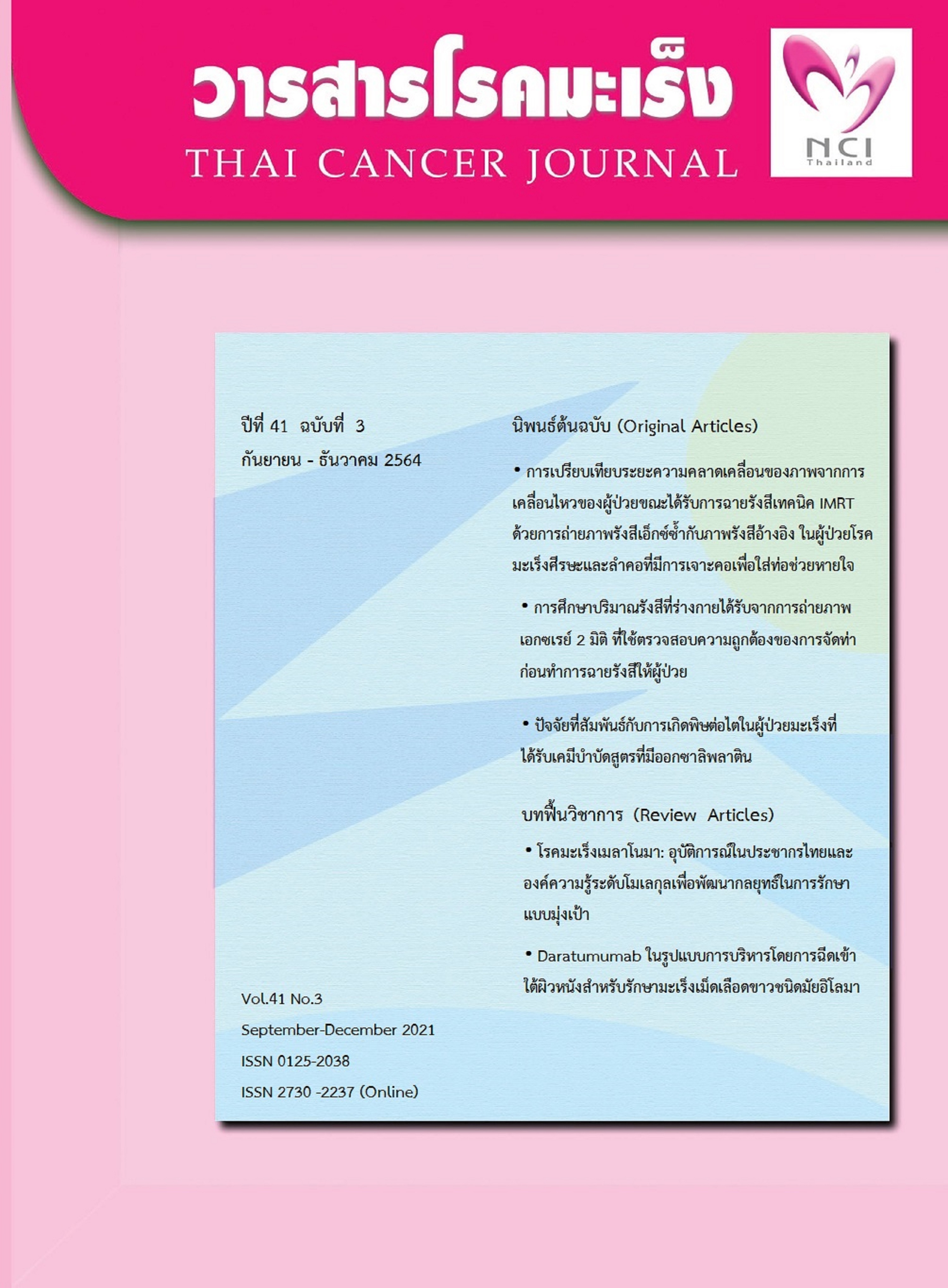Risk factors Associated with nephrotoxicity in cancer patients treated with oxaliplatin based chemotherapy
Keywords:
Oxaliplatin, Platinum-based chemotherapy, NephrotoxicityAbstract
Oxaliplatin, one of the platinum drugs, is an effective agent for treating gastrointestinal cancers, especially colorectal cancer, increasing incidence and one of the major causes of cancer patient deaths in Thailand. Nowadays, there are a few reports of the incidence of oxaliplatin nephrotoxicity. This study aimed to assess the incidence and risk factors associated with nephrotoxicity in cancer patients treated with oxaliplatin-based chemotherapy. All data were extracted from electronic medical records of patients aged 18 years who received oxaliplatin-containing regimens from the first until the last cycle at a medical school hospital in Bangkok in 2018. Results: A total of 64 patients were female (60.9%). The mean age was 57.8 ± 12.4 years. Most of the patients had gastrointestinal cancers (95.3%), and 68.8% had metastatic cancer. Nephrotoxicity was defined as an increase of Scr ≥ 25% from baseline. There were nine patients with nephrotoxicity (14.1%). Nephrotoxicity was reported in 4 patients (44.4%) in the first cycle. Nephrotoxicity was found in the patients with an ECOG PS status of 0 more than the other groups, about 36.4% (P = 0.031). Patients with kidney disease were more prominent in the nephrotoxicity group(75% VS 10%, P = 0.007). The total number of cycles administered was significantly associated with oxaliplatin nephrotoxicity (P = 0.015). The nephrotoxicity group received more cycles of chemotherapy (a median process was 9). In addition, three from nine patients had more than one episode of nephrotoxicity (33.3%). Conclusion: Although oxaliplatin nephrotoxicity has rarely been reported. This study found that one in seven of Thai cancer patients who underwent oxaliplatin-based chemotherapy had developed nephrotoxicity. Thus in practice, frequent monitoring of Scr should be done to detect and treat oxaliplatin nephrotoxicity early.
References
World Health Organization. Cancer key facts. Available at:http://www.who.int/news-room/fact-sheets/detail/cancer. Accessed May 22, 2021
คณะกรรมการจัดทำแผนการป้องกันและ ควบคุมโรคมะเร็งแห่งชาติ. แผนการ ป้องกันและควบคุมโรคมะเร็งแห่งชาติ พ.ศ. 2561-2565. เข้าถึงได้จาก: http://www.nci.go.th/th/File_download/D_index/เล่มแผนการป้องกันและควบคุมโรคมะเร็ง.pdf. สืบค้นเมื่อวันที่ 22 พฤษภาคม 2564
จักรพันธ์ อยู่ดี, นิรชร คูชลธารา, พิชญ์จิรา สงวนบุญญพงษ์, วรรณพร วัฒนะวงษ์,สุภัสร์ สุบงกช, บรรณาธิการ. คู่มือมาตรฐานการทำงานเกี่ยวกับยาเคมีบำบัดและการดูแลผู้ป่วยหลังได้รับยา. กรุงเทพฯ: นิวธรรมดาการพิมพ์; 2560
Labaye J, Sarret D, Duvic C, et al. Renal toxicity of oxaliplatin. Nephrology Dialysis Transplantation 2005;20: 1275-6
inotti G, Martinelli B. A case of acute tubular necrosis due to oxaliplatin. Annals of oncology 2002;13:1951.
Jain A, Dubashi B, Parameswaran S, Ganesh R. Oxaliplatin induced acute tubular necrosis. Indian journal of cancer 2015;52:363-4
Yaghobi Joybari A, Sarbaz S, Azadeh P, et al. Oxaliplatin-induced renal tubular vacuolization. Annalsof Pharmacotherapy 2014;48:796-800.
Yamada S, Yazawa M, Yamamoto M, et al. A case of biopsy-proven oxaliplatin-induced acute tubulointerstitial nephritis with hrombocytopenia and anemia. CEN Case Rep 2019;8:188-93.
Luo HY, Xu RH, Wang F, et al. Phase II trial of XELOX as first-line treatment for patients with advanced gastric cancer. Chemotherapy 2010;56:94-100.
Kosugi C, Koda K, Ishibashi K, et al. Safety of mFOLFOX6/XELOX as adjuvant chemotherapy after curative resection of stage III colon cancer: phase II clinical study (The FACOS study). Int J Colorectal Dis 2018;33:809-17.
Cochran WG. Sampling Techniques. 2nd ed. New York: John Wiley & Sons; 1963.
Latcha S, Jaimes EA, Patil S, Glezerman IG, Mehta S, Flombaum CD. Long-Term Renal Outcomes after Cisplatin Treatment. Clin J Am Soc Nephrol 2016;11:1173-9.
Inadomi K, Kusaba H, Matsushita Y, et al. Efficacy and Safety Analysis of Oxaliplatin-based Chemotherapy for Advanced Gastric Cancer. Anticancer Res 2017;37:2663-71.
Chen S, Feng X, Li Y, Yuan X, Zhou Z, Chen Y. Efficacy and safety of XELOX and FOLFOX6 adjuvant chemotherapy following radical total gastrectomy. Oncol Lett 2012;3:781-6.
Downloads
Published
Issue
Section
License
บทความทีตีพิมพ์ในวารสารโรคมะเร็งนี้ถือว่าเป็นลิขสิทธิ์ของมูลนิธิสถาบันมะเร็งแห่งชาติ และผลงานวิชาการหรือวิจัยของคณะผู้เขียน ไม่ใช่ความคิดเห็นของบรรณาธิการหรือผู้จัดทํา







